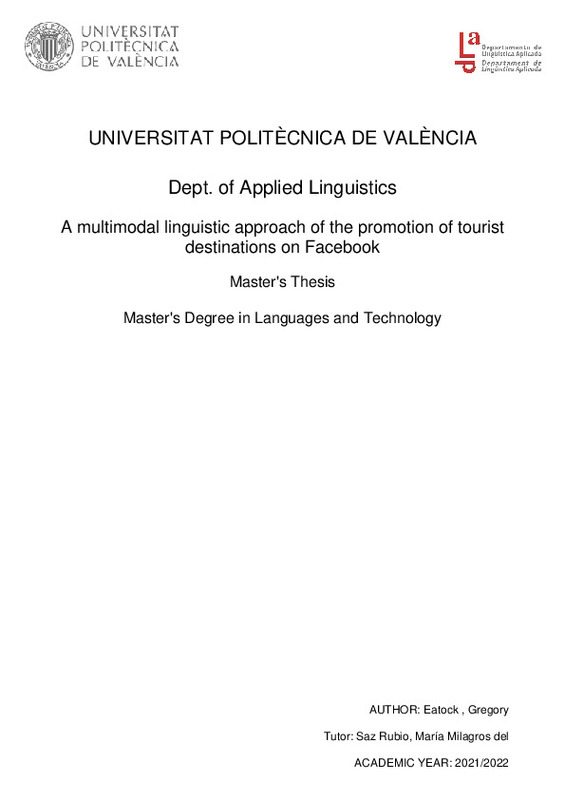JavaScript is disabled for your browser. Some features of this site may not work without it.
Buscar en RiuNet
Listar
Mi cuenta
Estadísticas
Ayuda RiuNet
Admin. UPV
A multimodal linguistic approach of the promotion of tourist destinations on Facebook
Mostrar el registro sencillo del ítem
Ficheros en el ítem
| dc.contributor.advisor | Saz Rubio, María Milagros del
|
es_ES |
| dc.contributor.author | Eatock, Gregory
|
es_ES |
| dc.date.accessioned | 2022-10-28T06:51:55Z | |
| dc.date.available | 2022-10-28T06:51:55Z | |
| dc.date.created | 2022-09-29 | |
| dc.date.issued | 2022-10-28 | es_ES |
| dc.identifier.uri | http://hdl.handle.net/10251/188886 | |
| dc.description.abstract | [ES] El objetivo principal de este trabajo es llevar a cabo un análisis pragmalingüístico y multimodal de dos cuentas oficiales de Facebook que promocionan destinos turísticos para investigar las mecanismos de persuasión que se ponen en marcha en las dos culturas, la británica y la española, dentro del ámbito de la comunicación mediada por ordenador en el campo del turismo. El estudio es contrastivo y toma como punto de partida la premisa de que las lenguas promocionan destinos turísticos de diferente forma considerando que las lenguas ofrecen no simplmente dos formasdistintas de expresar un mismo concepto sino de "pensarlo" (Crystal 2004). Para estudiar cómo se articula la función interpersonal del lenguaje nos centraremos en analizar las unidades metadiscursivas interactivas en una cuenta española y otra inglesa en Facebook, las cuales promocionan dos destinos turísticos. Además, teniendo en cuenta la importancia de la comunicación multimodal en las industrias del turismo (Francesconi 2014), examinaré el papel de elementos no verbales (como emojis) y cómo ayudan al escritor a mostrarse en el texto, y a crear interacción con el posible potencial receptor del mismo. La metodología será mixta y el análisis será tanto cualitativo como cuantitativo, pudiendo hacer uso de herramientas de lingüística de corpus para la cuantificación de los elementos metadiscursivos. Con este trabajo, esperamos identificar como los actos de hablar relacionales se llevan a cabo en el ámbito de la comunicación mediada por ordenador en una cuenta en inglés y otra en español. | es_ES |
| dc.description.abstract | [EN] The main aim of this study is to carry out a pragmalinguistic and multimodal analysis of two social media Facebook official accounts which promote tourist destinations to investigate the different persuasive mechanisms deployed in the Spanish and British cultures in computer-meditated communication within the field of tourism. The study will be of a contrastive nature, and it will take as a starting premise the fact that different languages have different ways of promoting destinations, and this means that sometimes languages offer not simply two parallel ways of saying the same, but other ways of thinking about them (Crystal 2004). To look into the interpersonal function of language, I will focus on interactional markers in one English and one Spanish Facebook page that promotes Spain and London as touristic destinations, respectively. Likewise, and considering the importance of multimodality in travel and tourism websites (Francesconi 2014), I will also look into emojis and other non-verbal elements that aid the creation of an authorial stance and how the reader is engaged in the discourse. My methodology will be both quantitative and qualitative (mixed-method). I will resort to corpus linguistics tools to quantify the metadiscoursal units, together with manual analysis. With this TFM, I hope to identify how relational acts are enacted in computer-mediated communication and assess if there are differences in the Spanish and British accounts. | es_ES |
| dc.format.extent | 97 | es_ES |
| dc.language | Inglés | es_ES |
| dc.publisher | Universitat Politècnica de València | es_ES |
| dc.rights | Reserva de todos los derechos | es_ES |
| dc.subject | Implicación autorial | es_ES |
| dc.subject | Comunicación mediada por ordenador | es_ES |
| dc.subject | Persuasión | es_ES |
| dc.subject | Multimodalidad | es_ES |
| dc.subject | Turismo | es_ES |
| dc.subject | Metadiscurso | es_ES |
| dc.subject | Persuasion | es_ES |
| dc.subject | Computer-mediated communication | es_ES |
| dc.subject | Tourism | es_ES |
| dc.subject | Multimodality | es_ES |
| dc.subject | Metadiscourse | es_ES |
| dc.subject | Authorial engagement | es_ES |
| dc.subject.classification | FILOLOGIA INGLESA | es_ES |
| dc.subject.other | Máster Universitario en Lenguas y Tecnología-Màster Universitari en Llengües i Tecnologia | es_ES |
| dc.title | A multimodal linguistic approach of the promotion of tourist destinations on Facebook | es_ES |
| dc.title.alternative | Un estudio lingüístico y multimodal de la promoción de destinos turísticos en Facebook | es_ES |
| dc.title.alternative | Un estudi lingüístic i multimodal de la promoció de destinacions turístiques en Facebook | es_ES |
| dc.type | Tesis de máster | es_ES |
| dc.rights.accessRights | Abierto | es_ES |
| dc.contributor.affiliation | Universitat Politècnica de València. Departamento de Lingüística Aplicada - Departament de Lingüística Aplicada | es_ES |
| dc.description.bibliographicCitation | Eatock, G. (2022). A multimodal linguistic approach of the promotion of tourist destinations on Facebook. Universitat Politècnica de València. http://hdl.handle.net/10251/188886 | es_ES |
| dc.description.accrualMethod | TFGM | es_ES |
| dc.relation.pasarela | TFGM\151122 | es_ES |






